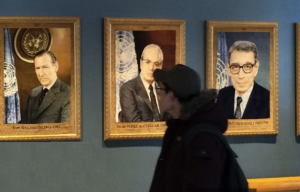FREE FLOW OF INFORMATION
An article by Mark Leon Goldberg, UN Dispatch
The race to become the next UN Secretary General just got slightly more crowded yesterday [April 5] when Helen Clark, former New Zealand prime minister and the current head of the UN Development Program, tossed her hat in the ring. Clark is one of the higher profile of the eight declared candidates. She is the fourth woman in the field and the only non-European to enter the race so far.

What makes her entry into the race particularly interesting is this straightforward video of her announcing her candidacy. It is the latest manifestation of just how radically new this process is to select a UN secretary general.
For the first time ever there will be a public campaign in the race to become the next UN Secretary General.
In the 70 years of United Nations, each of the eight Secretaries General were selected behind closed doors. Those doing the selecting were the five permanent members of the Security Council: the USA, Russia, the UK, France and China. Those countries would select a man to represent the United Nations and then the General Assembly, which is made up of all UN member states, would rubber stamp the pick.
This time around is wholly different. First, to be considered for the job, each candidate must first be nominated by their country. The process for doing so is straightforward: the country sends the nominating letter to the President of the General Assembly, who posts the candidates’ nominating letters and resumes to this website.
Now, for the first time in 70 years the general public knows exactly who is in the running for UN Secretary General. This counts as radical: even that modest amount of transparency was never really in the cards before.
The declared candidates as of April 4 (minus Helen Clark) and the dates they entered the race.
Dr. Srgjan Kerim, 30 December 2015
Prof. Dr. sc. Vesna Pusic, 14 January 2016
Dr. Igor Luksic, 15 January 2016
Dr. Danilo Turk, 9 February 2016
Ms. Irina Bokova, 11 February 2016
Ms. Natalia German, 19 February 2016
Mr. Antonio Guterres, 29 Febuary 2016
Because the process is open, there is a degree of public campaigning that has never existed. Candidates will be forced to go on the record with their positions on various key global issues. Their performance as communicators, diplomats and politicians will be evaluated by the press, the public, and all UN member states.
(Article continued in right column)
(Click here for the original Spanish of this aricle.)
Can the UN help move the world toward a culture of peace?
(Article continued from left column)
On April 12, 13, and 14 each candidate will submit to two hours of questioning from the General Assembly. The President of the General Assembly, Mogens Lykketoft of Denmark, is presiding over the affair. For two hours, each candidate will be put on the spot by member states. Not only will their answers be judged on the merits, but their effectiveness as communicators will be tested as well.
And because this has never been done before, no one really knows what kinds of questions will be asked. Will groups of countries, like the EU, band together to ask the same questions to each candidate? Will it result in high minded discussions of the future of the UN? Will individual countries use their moment at the mic to score petty domestic political points? The answer is that we have absolutely no clue. That’s what makes this moment so interesting for UN watchers–the theater is not only in the answers given, but the questions asked. Also, questions will not only come from member states, but also from the NGO community and civil society, which has been invited to participate in this vetting.
Then, later in the week, the Guardian is holding town-hall style debate in New York in which journalists and the public can pose questions to the candidates. (Questions from the public are being solicited here.) Later in the Spring, a similar event will take place in London.
The Security Council is expected to begin its deliberations in July. To be sure, as in year’s past the candidate must find favor (or at least not be vetoed) by each of the five permanent members. The Security’s Council’s selection is then passed along to the General Assembly for a final vote.
But unlike year’s past, each member of the General Assembly — and the public at large — will have had the opportunity to vet the candidates. The candidate will need to prove her or his worth well before the final selection this summer.
(Thank you to Janet Hudgins, the CPNN reporter for this article.)